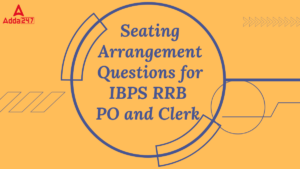The more you practice, the better you get. So, to let you practice and ace the score in the Reasoning Section of all the Banking Examinations, Bankersdda is proving you with Reasoning Questions and Answers on various topics. Try to attempt these question yourself to score in upcoming IBPS RRB PO Mains, IBPS RRB Clerk, IBPS Clerk, other banking and insurance exams.
Directions (1-5): Study the following information carefully and answer the questions given below.
Eight boxes namely P, R, S, T, U, M, N and O are placed from top to bottom but not necessarily in the same order. They contain different types of books among Hindi, English, Sanskrit, Math, Science, Physics, Chemistry and Civics. Boxes are of different colours among red, green, black and yellow colour. Exactly two boxes are there of each colour. Consider top as 1st position and so on. The following information is known about them. There is
There is gap of one box between the box T which is green colour and box R and both are in the top 4 positions when boxes are arranged from top to bottom. The box containing Math book is kept immediately below black colour box and is of same colour as T. Box S is kept somewhere between N and O. Box O is below S. The two yellow boxes are kept vertically adjacent to each other. Sanskrit book is kept exactly between M and the box containing Physics book. O doesn’t contain Hindi book. There is gap of one box between the box U and box N, which is kept immediately below the box containing Math book. Box U is below the box N. The box containing Civics book is placed at even numbered place but is not placed at the bottom. The red colour box which is kept at top either contains Hindi or Chemistry book. Box U is not of yellow colour. Box M which contains Science book is of black colour. The box containing English book is of black colour. S doesn’t contain any of Hindi or Civics book.
There is gap of one box between the box T which is green colour and box R and both are in the top 4 positions when boxes are arranged from top to bottom. The box containing Math book is kept immediately below black colour box and is of same colour as T. Box S is kept somewhere between N and O. Box O is below S. The two yellow boxes are kept vertically adjacent to each other. Sanskrit book is kept exactly between M and the box containing Physics book. O doesn’t contain Hindi book. There is gap of one box between the box U and box N, which is kept immediately below the box containing Math book. Box U is below the box N. The box containing Civics book is placed at even numbered place but is not placed at the bottom. The red colour box which is kept at top either contains Hindi or Chemistry book. Box U is not of yellow colour. Box M which contains Science book is of black colour. The box containing English book is of black colour. S doesn’t contain any of Hindi or Civics book.
Q1.Which box contains English book?
(a) P
(b) R
(c)T
(d)O
(e)S
Q2. Which box is of black colour?
(a)S
(b)O
(c)U
(d)P
(e)T
Q3.Which box is placed at top?
(a)The box which contains Chemistry book
(b)R
(c)U
(d)O
(e)P
Q4. Which box is placed at 8th position?
(a)P
(b)R
(c)S
(d)O
(e)T
Q5. Which subject book does box N contain?
(a)Chemistry
(b)Physics
(c)Sanskrit
(d)Math
(e)Civics
Directions (6-10): Study the following information and answer the given questions:
Nine people – P, Q, R, S, T, U, V, W, and X live on separate floors of a 9-floor building. Ground floor is numbered 1, first floor is numbered 2 and so on until the topmost floor is numbered 9. Each one of these is travelling to a different city of India viz. Noida, Delhi, Agra, Kanpur, Meerut,Varanasi, Pune, Patna, and Mumbai but not necessarily in the same order.
Only five people live above the floors on which P lives. Only one person lives between P and the one travelling to Varanasi. U lives immediately below the one travelling to Delhi. The one travelling to Delhi lives on an even numbered floor. Only three people live between the ones travelling to Varanasi and Agra. T lives immediately above R. T is not travelling to Agra. Only two people live between Q and the one travelling to Meerut. The one travelling to Meerut lives below the floor on which Q lives. W is travelling to Patna and lives on floor no. 8.The one travelling to Noida does not live immediately above or immediately below Q.S does not live immediately above or immediately below P. X travelling to Mumbai and lives immediately above W. V does not travel to Kanpur.
Q6.Which of the following is true with respect to V as per the given information?
(a)The one, who lives immediately below V, is travelling to Delhi.
(b)V lives on floor no. 7.
(c)V lives immediately below T.
(d)V lives on the lowermost floor.
(e)V is travelling to Varanasi.
Q7.Who amongst the following lives on floor no. 3 ?
(a)The one travelling to Kanpur
(b)The one travelling to Meerut
(c)R
(d) V
(e) T
Q8.Who lives on the floor immediately above T ?
(a) P
(b) Q
(c) S
(d) V
(e) U
Q9.Which of the following cities is S travelling?
(a)Delhi
(b) Varanasi
(c) Agra
(d) Meerut
(e) Kanpur
Q10.How many people live between the floors on which S and the one travelling to Mumbai live?
(a) None
(b) Two
(c) One
(d) More than three
(e) Three
Directions (11): Each question below is followed by three arguments numbered I, II and III. You have to decide which of the arguments is a ‘strong’ argument and which is a ‘weak’ argument.
Q11. Statement: Should there be only few banks in place of numerous smaller banks in India?
Arguments:
I. Yes. This will help secure the investor’s money as these big banks will be able to withstand intermittent market related shocks.
II. No. A large number of people will lose their jobs as after the merger many employees will be redundant.
III. Yes. This will help consolidate the entire banking industry and will lead to healthy competition.
(a) None is strong
(b) Only I and II are strong
(c) Only II and III are strong
(d) Only I and III are strong
(e) All are strong
Q12. Statement: The army has been alerted in the district following floods triggered by incessant rains.
Courses of Action:
I. Relief to flood-affected people should be arranged.
II. Supply of food articles should be arranged.
III. Adequate medical facilities should be arranged.
(a) None follows
(b) Only I follows
(c) Only II follows
(d) All follow
(e) Only III follows
Q13. Statement: Many students of the local school fell ill for the fourth time in a row in the last six months after consuming food prepared by the school canteen.
Courses of action:
I. The school management should immediately terminate the contract of the canteen and ask for compensation.
II. The school management should advise all the students not to eat food articles from the canteen.
III. The owner of the canteen should immediately be arrested for negligence.
(a) None follow
(b) Only II follow
(c) Only III follow
(d) Only I and II follow
(e) Only II and III follow
Directions (14-15): In each question below is given a statement followed by two conclusions numbered I and II. You have to assume everything in the statement to be true, then consider the two conclusions together and decide which of them logically follows beyond a reasonable doubt from the information given in the statement.
Give answer
(a) if only conclusion I follows;
(b) if only conclusion II follows;
(c) If either I or II follows;
(d) if neither I nor II follows; and
(e) if both I and II follow.
Q14. Statement: The standard of education in private schools is much better than Municipal and Zila Parishad-run schools.
Conclusions:
I. The Municipal and Zila Parishad should make serious efforts to improve standard of their schools.
II. All Municipal and Zila Parishad schools should be closed immediately.
Q15. Statement: In a recent survey, it has been stated that those who undertake physical exercise for at least half an hour a day are less prone to have any heart ailments.
Conclusions:
I. Moderate level of physical exercise is necessary for leading a healthy life.
II. All people who do desk-bound jobs definitely suffer from heart ailments.
You May also like to Read:





 GA Capsule for SBI Clerk Mains 2025, Dow...
GA Capsule for SBI Clerk Mains 2025, Dow...
 The Hindu Review October 2022: Download ...
The Hindu Review October 2022: Download ...
 Seating Arrangement Questions for IBPS R...
Seating Arrangement Questions for IBPS R...





